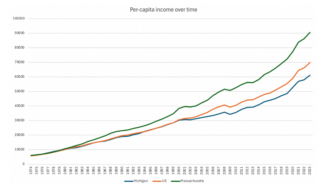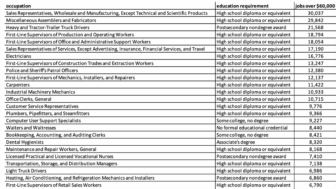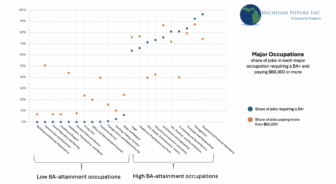
K-shaped economy is how many describe our economy since the pandemic. And most expect the recovery to be K-shaped as well. The reality is that the Michigan economy was K-shaped pre-pandemic. With those at the top doing well, but far too many households struggling in the strong 2019 Michigan economy.
As we explored in our last post, the Michigan Association of United Ways calculates that nearly four in ten Michigan households in 2019 could not pay for basic necessities. So a K-shaped economy is structural. A reality when the Michigan economy is expanding as well as when it is contracting. A reality when unemployment is low and high. A reality when the stock market is booming as well as when it is collapsing.
It is now crystal clear, far too many of our families have not been succeeding for far too many years. If they are not succeeding, our state is not succeeding.
Figuring out how you get an American capitalism that as it grows benefits all is the economic challenge of our times. We can––and should––debate how to achieve an economy that benefits all. What we should not do is celebrate an economy that is leaving so many behind.
It is far past time that we commit to turning a K-shaped economy into an economy that benefits all. We need a new economic strategy in Michigan. One that starts with rising income for all as the state’s economic mission. Income––particularly good-paying jobs and careers––needs to become the prime focus of economic policy and economic and workforce development programming.
We believed before the onset of the pandemic––and even more so now––that this is the time to make fundamental change in the state’s playbook to increase the economic well-being of all Michiganders. That now is the time for a transformative redesign of our approach to the economy. To us mid-course adjustment in what we have been doing is not the path to achieving rising income for all. So our recommendations for turning our K-shaped economy into an economy that benefits all are explicitly designed for fundamental change. To rethink what is foundational to state policy and programming to achieving rising income for all and go big in building that foundation.
To us that means a state economic policy laser-like focused on good-paying jobs and careers. We need policies designed so that all Michigan workers have wages and benefits that allow them to pay the bills, save for retirement and the kids’ education and pass on a better opportunity to the next generation.
Specifically we need policies that will:
Increase income and health coverage for today’s low-wage workers through an expanded and no red tape safety net.
Michigan cannot substantially reduce the proportion of households that cannot pay for basic necessities unless it finds ways to increase the amount of work and the pay and benefits for those who work in low-wage jobs. The past four decades have made clear that market forces alone will not turn low-skill, low-wage jobs into family-supporting work. In the strong 2019 Michigan economy 58 percent of payroll jobs were in occupations with a full-time median wage below the nation median of $39,810. We need public policy designed to raise the returns from work.
What low-wage workers need more than anything is more income and health coverage. We need cash-based benefits for those who are working. And we need cash-based benefits for those who have lost their jobs. We also need to make safety net benefits far easier to get. The struggles today that way too many Michiganders are going through to get safety net benefits make clear that we need to go to no red tape cash benefits plus health coverage.
Prepare all Michigan children for good-paying forty-year careers by making the 6Cs the foundational skills for all students from birth through college.
To thrive in the new economy, workers have to be adaptable, have a broad base of knowledge, be creative problem-solvers and be able to communicate and work well with others. In other words, workers need to be really good at all of the non-algorithmic skills computers aren’t good at yet.
The best definition we have found for this complex set of skills comes from the book Becoming Brilliant, by learning scientists Roberta Michnick Golinkoff and Kathy Hirsh-Pasek, who label these skills the six Cs: collaboration, communication, content, critical thinking, creativity and confidence.
In Michigan today the education that is provided for affluent kids is, by and large, designed and executed differently than it is for non-affluent kids. One system delivers a broad college prep/6Cs education, the other delivers an increasingly narrow education built around developing discipline and what is on the test or to narrowly preparing non-affluent children for a first job. Our goal should be to design an education system that provides for all children the experiences that affluent children take for granted. Only then can we say that we’re providing each and every Michigan child with an education that will prepare them for good-paying forty-year careers.
In addition to current education funding, an annual grant from birth through college for all children in households unable to pay for the basics.
We strongly believe Michigan under invests in its children. Particularly its non-affluent children. And even more so its Black and Latino children. There is no path to income equality and racial equality that does not include, front and center, far better education outcomes.
To us the evidence is clear: The formula for ending what is increasingly becoming an education caste system—where for the first time in American history parents’ education attainment is the best predictor of a child’s education attainment—is both far higher quality teaching and learning and substantially more funding for children growing up in non-affluent households from birth through college.
We believe that under investment starts at birth and continues through college. So we propose Michigan substantially increase its investment in the education of every child growing up in a household struggling to pay for basic necessities each year from birth through the age of 21.
Think of this as something that operates, for education related expenses, like a health savings account. An annual government deposit, above and beyond current education spending, for each child 0-21 growing up in a Michigan household struggling to pay for the basics. Where the decision on education-related programming is controlled by parents and students. Including the option of utilizing those funds for extracurriculars and out of school programming.
Create more high-paid jobs by creating places where people want to live and work.
Every Michigan region needs more high-wage jobs. This is an economy where talent attracts capital. Creating a place where people want to live, work and play is what matters most to retaining, attracting and creating more high-wage jobs. Those regions without the quality of place that mobile talent is looking for will be at a substantial disadvantage.
It is also clear that the desirable mix of infrastructure, basic services and amenities differ from region to region. What makes small towns and rural communities attractive places to live and work are different than what makes big metros and their big central cities attractive places to live and work. So Michigan’s diverse regions need the resources and flexibility to develop and implement their own strategies to retain and attract talent. It’s an essential ingredient to their future economic success.
Responsibility and funding should be moved from the state to regions for all modes of transportation (except state highways); water; parks and outdoor recreation (except state parks); housing; and all other local/regional infrastructure, basic services and amenities. Responsibility and funding should be returned with little or no state mandates on how funds can be raised and used. The goal is to empower regions to develop and fund their own strategies for creating places where people want to live, work and play.







